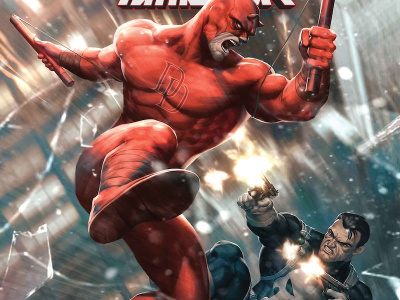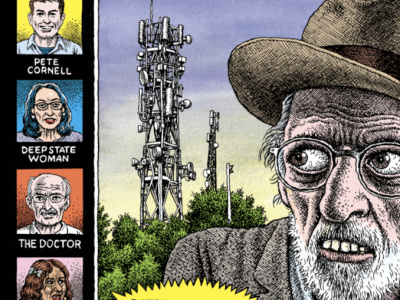
Disclosure: ICv2 has a business relationship with comiXology as a representative for its Retailer Tools; ICv2 CEO Milton Griepp also serves on the board of comiXology.
ComiXology customers have downloaded over 50 million comics since launch, comiXology CEO David Steinberger told ICv2 in a recent interview, with over five million of those coming in December of 2011 alone. The Comics by comiXology app launched for the iPhone and iPod in July of 2009. ComiXology’s digital comics platform was extended to the iPad when it was launched in April of 2010, to the Web in July of 2010, and to Android in December of that year. And in December 2011, the Kindle Fire was added as a platform.
ComiXology customers have downloaded over 50 million comics since launch, comiXology CEO David Steinberger told ICv2 in a recent interview, with over five million of those coming in December of 2011 alone. The Comics by comiXology app launched for the iPhone and iPod in July of 2009. ComiXology’s digital comics platform was extended to the iPad when it was launched in April of 2010, to the Web in July of 2010, and to Android in December of that year. And in December 2011, the Kindle Fire was added as a platform.
“This milestone shows the tremendous demand for digital comics from comiXology and the strength of our partnerships and reach, from device manufacturers to publishers to brick-and-mortar retailers,” comiXology CEO David Steinberger told ICv2 in an exclusive interview. “And it shows the huge opportunities that exist to grow the comics market by bringing in new or lapsed readers that want a digital option for reading comics.”
ICv2 notes that the five million comics downloaded in December 2011 compares to roughly 6.4 million comics and graphic novels sold into the comic store market in the same period (an ICv2 estimate based on sales indexes released by Diamond Comic Distributors). It’s not a direct comparison, because a significant percentage of the 5 million comics downloaded were free (which would compare to “pass-along” circulation for physical comics), but it gives some scale to the December download number.
This news comes in the wake of the release of ICv2’s estimate of $25 million for the digital comic market size in 2011, more than tripling the 2010 total (see “Digital Comics Triple in 2011”).
The big question, of course, is whether digital comics represent an opportunity or a threat to print comics and graphic novels, sold primarily through comic stores and bookstores. Comic publishers tell ICv2 that they believe the digital business is adding to, rather than shrinking, the print business.
DC Comics SVP Bob Wayne shared DC’s observations in a recent interview (see “Rood and Wayne on January Numbers”). “I think we’re just finding that yeah, there are some people who used to buy print comics who have migrated, but I think you’ll find there are more people who weren’t buying print comics who come into the habit of reading comics, and I think a lot of those people will eventually come in to buy a collected edition to have on their shelf if there’s something they like and they want to have it in a more permanent physical form,” he said.
Marvel SVP-Sales David Gabriel also stressed the ways the digital and print market can work together in a recent interview with ICv2 (see “Interview with Marvel’s David Gabriel-Part 3”). “[W]e need a new way to grab non fans and make them readers--because more readers benefit everyone,” he said. “We can’t ignore that digital revolution of the last decade and we should be working together, publishers and retailers, to make it benefit us all… [E]very digital comic that we sell points to the print version as well as assists in locating comic shops to purchase the print comics. The exact same arguments were in play 12 years or so ago when folks were arguing that all publishers were pushing consumers from single issue comics to collected editions. Twelve years later we see where that argument is.”
IDW Publishing was an early and enthusiastic supporter of the new digital channels. IDW CEO Ted Adams shared the view that digital sales are not hurting print. “Our print sales are generally strong as well,” he said of titles that were doing well in digital form, “so there’s no visible attrition of print sales due to digital.”
And Top Cow publisher Filip Sablik noted that some of the new digital sales are coming from fans that previously were reading pirated content. “The transition from pirated content to legal digital content was a necessary one,” Sablik said. “Anybody that thinks piracy doesn’t have an impact is drinking the Kool-Aid. But there’s a pretty significant group of people that were reading illegal content that if they have a legal, safe, easy way to buy they do so.”
“Once you’re into the system and can sync across platforms, it’s not worth the hassle to get illegal copies,” he said.
ComiXology CEO Steinberger stressed his support for a healthy comics business in both digital and print formats. “Our business started by creating tools for consumers and retailers of print comics, and it’s an important part of comiXology,” he said. “With our Online Pull List service for fans, our free comic store locator system on the Web and in our digital comic apps, where we have a “Buy in Print” button that leads users to their local comic store, and our Comic Store Websites and other services for retailers, we’re the only digital comics company that supports the full ecosystem of comics, from the comic stores to digital sales.”
“ComiXology also offers an innovative Digital Storefront program that allows comic stores to add digital comics to their Websites with an easy integration,” Steinberger said, “as we see comic stores as partners in the digital comics business as well as in print comics.”
We asked Steinberger where he saw the business going in the future. “We’re bullish on both the digital and print markets for comics,” he said. “We’re all comic lovers here, and we think that the more people that are exposed to great comics, the more the market in all forms can grow.”







